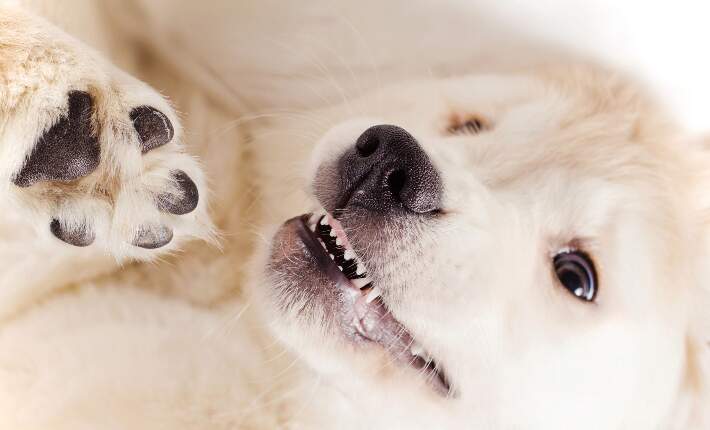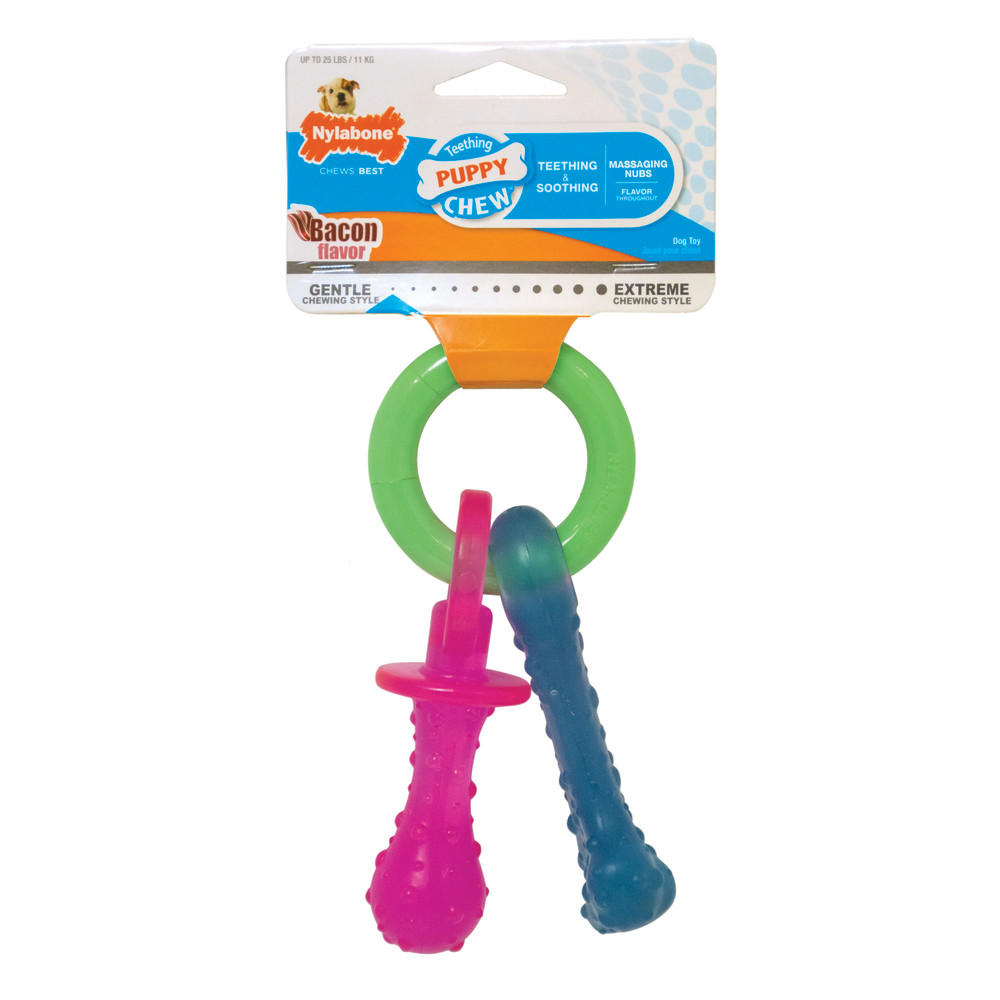Puppy Teething: Stages, Symptoms, and Solutions
It happens to almost every pet parent: Your new puppy starts gnawing on your furniture, nipping at your feet, and chewing anything else they can get their teeth on. It is probably the result of puppy teething—and chewing is simply nature's way of relieving discomfort as your pup's adult teeth come into place. We have the lowdown on guiding your dog through this developmental stage and encouraging healthy chewing habits right from the start.
What Is Puppy Teething?

Puppy teething occurs when a dog's baby teeth start falling out and their permanent teeth begin to emerge behind them. It's a natural, healthy process that is critical to your pup's development…and a sign they are growing up! If you're lucky, your pup will breeze through teething with just a few symptoms as their adult teeth develop. Many dogs, however, experience quite a bit of discomfort when teething—and that's where chewing comes into play.
The puppy teething process often causes sore gums, which happens when the adult teeth start pushing their way in through the gumline. Chewing provides a soothing activity to help relieve teething discomfort. In fact, expect your furry friend to do lots of nibbling and gnawing as they grow; puppies also chew as a means to explore their surroundings.
The Puppy Teething Stages Explained

Teething begins very early in a pup's life—likely before you even welcomed your new friend home! Puppies start to develop their baby teeth a few weeks after they are born, and in some cases, they can appear at just two weeks. These teeth are often called "milk teeth" because pups are still nursing when they appear. All 28 of your puppy's baby teeth should come in by the time they are five to eight weeks old, according to The Spruce Pets.
The next puppy teething stage begins by four or five months of age, when your pup's baby teeth start falling out. Dogs swallow most of their baby teeth (which is completely harmless), but you might spot a few teeth lying on the floor. Expect to see your dog chewing more frequently as teething discomfort becomes more evident; this is one of the telltale signs of teething.
Eventually, your dog's 42 adult teeth will start coming in when they are six to eight months old.
Puppy Teething Symptoms

Teething is not difficult to identify. The following common puppy teething symptoms may indicate your dog's adult teeth are on their way:
- Excessive chewing or nipping
- Drooling
- Small blood spots on your dog's toys
- Red or swollen gums
- Fever
- Slower-than-normal eating
- Crying or whining
If your dog's teeth are crooked or broken, contact your veterinarian for advice and treatment. A professional may need to remove baby teeth that are stuck or otherwise preventing adult teeth from coming in.
Best Solutions for Managing Puppy Teething

Your puppy has started teething…now what? The good news is that chew toys, training, and puppy-proofing can help you and your furry friend get through this process without a fuss. Follow these tips to successfully manage puppy teething.
Offer Teething Chew Toys
Not only is chewing an essential part of teething, it's also a natural instinct that keeps dogs occupied and helps them manage a variety of emotions. Offering your furry friend appropriate puppy chew toys will give them teething relief and provide a safe, healthy chewing outlet. Many chew toys for teething puppies are made of softer materials for delicate baby teeth. However, puppies who are more powerful chewers or already have their adult teeth may need chew toys that are more durable. For added relief, freezer puppy chew toys can help ease gum pain and provide a comforting chewing experience.
Make sure all chew toys are appropriate for your puppy's size and weight, and always supervise your dog while they chew. Dogs maintain their chewing habits into adulthood, so your furry friend can graduate to a tougher chew toy once they get their permanent teeth.
Use our Custom Product Finder Tool to select the best chew toy for your teething puppy!
Work on Obedience Training
Starting obedience training from a young age will help your dog become familiar with your home's rules. When it comes to teething, it's up to you to teach your puppy which potential chewing targets are off-limits.
If your teething puppy nips at any part of your body—particularly your fingers or toes—utter a sudden sound such as "No!" or "Ah!" to startle your dog and show them this is not acceptable behavior. Once your dog stops nipping, reward them with praise or a puppy chew treat. If your dog does not respond to your command, provide a few minutes of crate time to help them settle down.
You can implement the same strategy if you see your dog chewing somebody's shoes, a piece of furniture, or any other household object. Alternatively, you can apply a chewing deterrent spray to inappropriate items your dog likes to chew. These training repellents often include bitter flavors that discourage chewing.
Puppy-Proof Your Home
If you haven't already puppy-proofed your home, your pup's teething period is a great opportunity to start. Gate off rooms, hide wires and cords, and keep inappropriate objects such as towels and magazines out of reach. As always, supervise your dog as often as possible.
It's also crucial to make potentially toxic items inaccessible. Plants such as aloe vera, daffodils, lilies, and tulips can be harmful to dogs. Likewise, foods and drinks including raisins, onions, chocolate, grapes, and caffeinated or alcoholic beverages are not safe for dogs.
Keep Those Teeth Healthy!
Puppy teething is an excellent time to establish a dog dental care routine. The sooner your dog grows comfortable with you cleaning their teeth, the more likely they are to accept regular brushing for years to come. This will also help you become familiar with your dog's teeth and mouth, which will come in handy when you're trying to brush hard-to-reach areas. Just be sure to contact your veterinarian if you spot anything out of the ordinary. Your puppy's adult teeth will arrive before you know it!
FOLLOW US!





